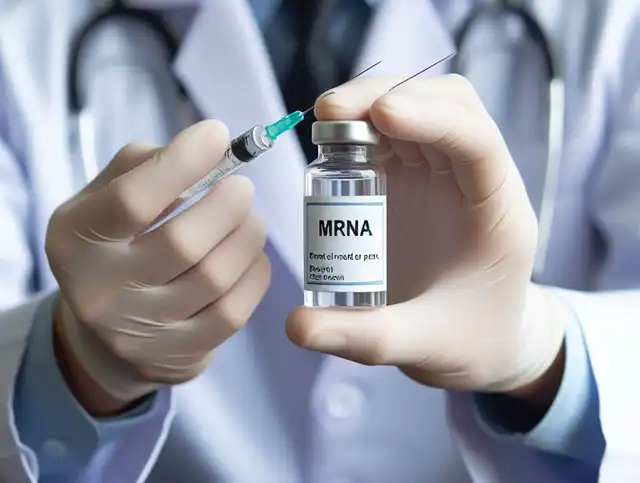Could mRNA Vaccines Be the Dawn of a New Era in Cancer Immunotherapy?
- Can Cytokine Modulation Enhance the Efficacy of CAR-T Cell Therapy?
- What Are HIV-Related Cancers and How Can They Be Prevented?
- Metformin: From Diabetes Treatment to a New Approach for HIV Cure
- Advances in Research on HPV-Related Oropharyngeal Cancer and Immunotherapy
- Could mRNA Vaccines Be the Dawn of a New Era in Cancer Immunotherapy?
- Parkinson’s and Alzheimer’s Diseases May Originate in the Gut!
Could mRNA Vaccines Be the Dawn of a New Era in Cancer Immunotherapy?
- Shocking! All existing AIDS vaccine developments have failed
- Sanofi Japan Data Breach: 730000 Healthcare Professionals’ Information Exposed
- CT Radiation Exposure Linked to Blood Cancer in Children and Adolescents
- FDA has mandated a top-level black box warning for all marketed CAR-T therapies
- Can people with high blood pressure eat peanuts?
- What is the difference between dopamine and dobutamine?
- How long can the patient live after heart stent surgery?
Could mRNA Vaccines Be the Dawn of a New Era in Cancer Immunotherapy?
Medical experts have been exploring the pathways for pharmaceutical companies to adapt and uncover new opportunities in the consumer healthcare market.

The Promise of mRNA Vaccines in Cancer Immunotherapy
Cancer immunotherapy aims to activate the body’s anti-tumor immune response, creating a tumor-suppressive environment to ultimately eliminate the tumor and improve overall patient survival. One promising approach in this field is cancer vaccines, which target tumor-associated antigens (TAAs) or tumor-specific antigens (TSAs). These vaccines can specifically attack and destroy cancer cells that express high levels of these antigens and provide sustained tumor elimination through immune memory. As a result, cancer vaccines could offer a highly specific, safe, and tolerable treatment compared to other forms of immunotherapy.
mRNA vaccines, a type of nucleic acid vaccine, were first proposed over 30 years ago. They offer several advantages over traditional vaccines: unlike some viral vaccines, mRNA does not integrate into the genome, avoiding the risk of insertional mutations. Furthermore, mRNA vaccines can be produced quickly, efficiently, and economically in a cell-free manner. A single mRNA vaccine can also encode multiple antigens, enhancing the immune response and targeting multiple pathogens or viral variants within one formulation.
In cancer treatment, mRNA vaccines can encode TAAs, TSAs, and relevant cytokines, stimulating both humoral and cellular immunity. This adaptability makes them promising candidates for treating various diseases and patient types. Currently, several mRNA cancer vaccines are in clinical development, shining a hopeful light on the future of cancer immunotherapy.
mRNA Vaccine Preparation Strategies
The structure of in vitro transcribed (IVT) mRNA mimics endogenous mRNA, consisting of five key elements: a 5′ cap, a 5′ untranslated region (UTR), an open reading frame encoding the antigen, a 3′ UTR, and a PolyA tail. These components help protect the mRNA, enhance its translation, and regulate its stability in cells. Researchers have made significant strides in optimizing mRNA sequences for higher efficacy in vaccine production.
mRNA Delivery Systems
Since mRNA molecules are large and negatively charged, they cannot easily pass through cell membranes and are vulnerable to degradation by enzymes in the body. To overcome this, innovative delivery systems, such as lipid nanoparticles (LNPs), have been developed. LNPs encapsulate and protect the fragile mRNA, facilitating its delivery into cells without triggering unnecessary immune responses. These LNP-based delivery methods have shown significant success in mRNA vaccines for COVID-19 and hold great potential for cancer vaccines as well.
Immune Response Induction by mRNA Cancer Vaccines
Once injected, mRNA cancer vaccines are translated into proteins by the body’s ribosomes, triggering an immune response similar to that of a natural viral infection. These proteins are presented to the immune system, stimulating both innate and adaptive immune responses. This includes the activation of antigen-presenting cells and T cells, which recognize and target cancer cells expressing TAAs or TSAs. mRNA vaccines can also induce neutralizing antibodies, further enhancing the immune system’s ability to fight cancer.
Clinical Development of mRNA Cancer Vaccines
Several mRNA cancer vaccines are in clinical trials, targeting a variety of tumor types. These vaccines can encode TAAs, TSAs, or immune-stimulating molecules like cytokines to reshape the tumor immune microenvironment. Notable examples include BioNTech’s BNT111 and Moderna’s mRNA-4157, both showing promising results in early-stage trials for melanoma and other cancers. These vaccines, either alone or in combination with immune checkpoint inhibitors, are paving the way for a new wave of personalized cancer treatments.
Conclusion
Over the past few decades, advancements in mRNA design and delivery technology, coupled with the discovery of new tumor antigen targets, have positioned mRNA vaccines as a powerful tool in the fight against cancer. This exciting field of research holds the potential to revolutionize cancer immunotherapy, offering new hope for patients worldwide.
Could mRNA Vaccines Be the Dawn of a New Era in Cancer Immunotherapy?
References:
(source:internet, reference only)
Disclaimer of medicaltrend.org
Important Note: The information provided is for informational purposes only and should not be considered as medical advice.



